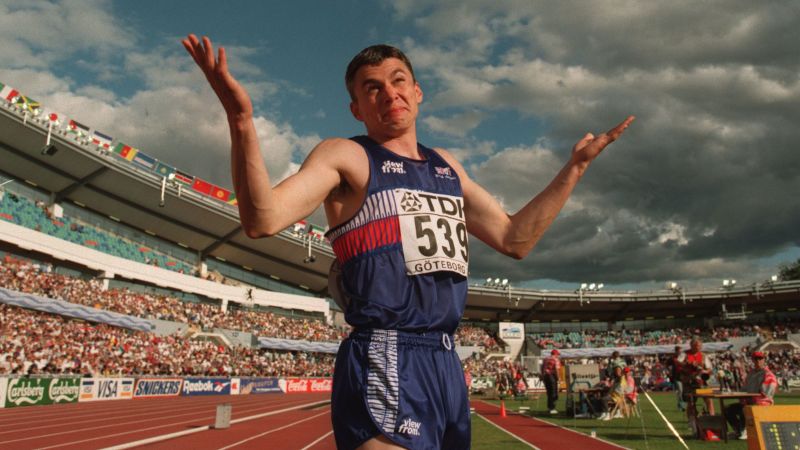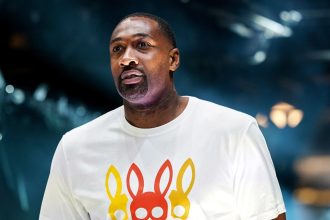Jonathan Edwards’ Historic Achievement
Arriving in Gothenburg, Sweden, Jonathan Edwards, the renowned triple jumper, made an unexpected decision at the duty-free shop. Instead of sunbathing by the picturesque coastline, he bought a pair of sunglasses to conceal his nerves ahead of the world championships, the premier event in track and field for that year. “I thought I could easily not win,” Edwards recalls, having entered the 1995 world championships in excellent form. “The potential was there for me not to win, and that would be a disaster, even though I jumped so well throughout the year.”
However, his fears were unfounded. Edwards shattered his own world record twice on that momentous day, achieving a remarkable jump of 18 meters and 29 centimeters (just over 60 feet) with his second attempt. His closest competitor, Bermuda’s Brian Wellman, fell short by nearly half a meter (1.64 feet).
30 Years of a Record
Thursday marks the 30th anniversary of Edwards’ monumental achievement, which continues to stand as one of the longest-lasting records in track and field history. Since then, only American Christian Taylor has come within 10 centimeters (about 3.94 inches) of Edwards’ record, while just eight athletes have ever surpassed the 18-meter (approximately 59.05 feet) mark.
Edwards often revisits footage of his groundbreaking jump, captivated by his swift approach, the rhythmic strides of his technique, and the impressive landing in the sandpit. Upon realizing he had broken the record, he raised his arms in triumph, later shrugging in disbelief as he awaited his results on the scoreboard. “It’s a wonderful thing, and it brings a smile to my face,” he tells CNN Sports. “Although it’s me, there’s something very aesthetically pleasing about watching that jump. To hold a world record, to do something better than anybody else has done in the history of the world, it’s remarkable.”
The Power of Belief
By that point, Edwards had essentially clinched the competition, becoming the first man to jump beyond 18 meters with his initial attempt and the first to exceed 60 feet (18.288m) with his second. He later recorded a third jump of 17.49m, but his earlier successes had already secured the gold medal. Reflecting on his achievements, Edwards mentions, “I still maintained that sort of heightened sense of readiness for that second jump. It was about grasping that moment and enjoying it and not feeling scared stiff about the thought of it going wrong, but rather trying to do something that was just remarkable and enjoying the moment.”
Comparing Eras
Only a select few men’s track and field world records have endured longer than Edwards’ 18.29, including Mike Powell’s long jump record of 8.95m (about 29.36 feet) set in 1991 and Javier Sotomayor’s high jump record of 2.45m (almost 8.04 feet) from 1993. Edwards attributes part of his record’s longevity to the depth of talent in jumping events during the 80s and 90s. He perceives that today’s athletics lacks the same level of investment and opportunity for young athletes. “I don’t think there’s the infrastructure there, the opportunity for young people,” Edwards explains. “Even if there is, athletics is probably not as attractive an option as some of the other sports, which are professionalized much, much better.”
The Unique Style of Edwards
This could help clarify why his triple jump record has remained unbroken, even with advancements in sports science and training. Edwards believes his style, characterized by a combination of speed and agility, sets him apart. “I’ve looked at all the jumpers who have gone since me, and none of them really jumped like me,” he notes. “They’re much bigger; I’m very slight. I probably didn’t look like a triple jumper… my pure jumping ability is not brilliant… but it’s when you come down to running at full speed and maintaining speed through the phases – I don’t think anybody lands like me and maintains their speed like me, hence jumping the furthest.”
Faith and Motivation
Jonathan Edwards’ path to becoming a professional athlete was uniquely influenced by his Christian faith, rather than just his athletic prowess. With support from his father, a Church of England vicar, he felt inspired to pursue athletics. “I don’t think I’d have been an athlete without my faith,” he reflects. “There was a sense of: God’s given me this gift, as peculiar as it might be.” Now at 59, Edwards has moved beyond his faith, which once played a critical role in managing competitive pressure. He describes this faith as an integral yet unnoticed part of his competitive mindset.
Reflecting on a Golden Era
In 1995, Edwards experienced a career peak, breaking the world record three times and earning gold in Gothenburg. He also achieved an unofficial jump of 18.43m in June that year, which, due to favorable wind conditions, was not ratified. “That still is the single most remarkable day of my career,” he says, reminiscing about the beauty of that jump. Yet, he acknowledges the challenges of maintaining consistent technique throughout his career, particularly after that extraordinary year.
Looking to the Future
Edwards later won a silver medal at the 1996 Atlanta Olympics, followed by gold in Sydney in 2000, although he considers his winning jump “not great.” He recognizes the technical complexity of the triple jump, which makes it difficult to execute perfectly each time. “It shows you how tough an event it is to get right because there are so many moving parts, quite literally, that can go wrong,” he observes. Edwards’ long-standing record may well be a testament to this demanding nature of the sport.
While all records are meant to be broken eventually, Edwards is not overly concerned about the fate of his own. “It’ll be fine if it’s broken, it’s not the be all and end all,” he says. Yet, he admits, “it’s become part of me. It’s part of my life. It’s an incredible thing to hold a world record.” If that day comes when his record falls, his preference is clear: “I definitely wouldn’t” want to witness it firsthand. “I’d like to be somewhere out of the way where nobody can get to me, and I can just process it in quiet and silence and isolation.” Perhaps another pair of sunglasses would help mask the bittersweet emotions of an era closing.






